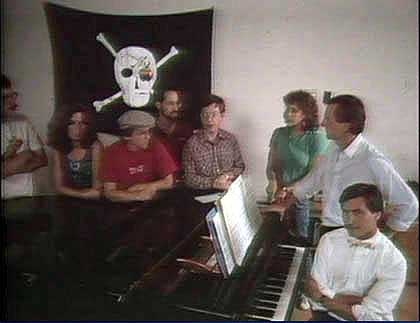 Remember the pirate days in Cupertino? In-fighting between the Apple II and Mac camps had gotten so out-of-hand that the GUI bandits themselves–those that believed the Macintosh was the way–moved out of HQ and raised a black flag bearing skull-and-bones. It might’ve been the first time in modern history that Jerry Bruckheimer missed his cue.
Remember the pirate days in Cupertino? In-fighting between the Apple II and Mac camps had gotten so out-of-hand that the GUI bandits themselves–those that believed the Macintosh was the way–moved out of HQ and raised a black flag bearing skull-and-bones. It might’ve been the first time in modern history that Jerry Bruckheimer missed his cue.
Flash forward to the late 2000’s and the story of Microsoft’s Courier, the tablet that was never to be.
As engagingly told by CNET’s Jay Greene, it was a bit of history repeated. According to Greene, whose deconstruction of a corporate culture turning on itself is based on interviews with 18 current and former executives among others:
“Courier’s death also offers a detailed look into Microsoft’s Darwinian approach to product development and the balancing act between protecting its old product franchises and creating new ones. The company, with 90,000 employees, has plenty of brilliant minds that can come up with revolutionary approaches to computing. But sometimes, their creativity is stalled by process, subsumed in other products, or even sacrificed to protect the company’s Windows and Office empires.”
And just like Apple decades earlier…
There were two internal camps pitted against each other. Steven Sinofsky (Head of Windows division) vs. J Allard (Xbox “godfather”).
And there was squabbling and fiefdom building…
“Allard also appreciated the importance of design, creating studios, rather than traditional office space, where his teams toiled. A key Allard trait: challenging convention.”
And then there was the decision…
“Within a few weeks, Courier was cancelled because the product didn’t clearly align with the company’s Windows and Office franchises … A few months after that, both Allard and Bach announced plans to leave Microsoft, though both executives have said their decisions to move on were unrelated to the Courier cancellation.”
BUT! Unlike the Apple Pirate Days of Cupertino, there was one HUGE difference in this ending…
Microsoft released nothing. Nada. No tablet.
Neither side won in their efforts to fully realize their vision in the form of a living-breathing product consumers could buy.
The results were not pretty, and now, according to Gartner, Microsoft will own about 4% (4.3 million units) of the tablet market in 2012.
They all saw iPad coming in 2009. They knew the tablet market was on the cusp.
In 1984 things were different; internal friction created a remarkable upheaval that forever changed the history of an industry. The Mac would re-write everything we knew about computers, operating systems, and, ultimately, consumer design.
So you have to wonder: Would Microsoft had been better off to at least fully realize one of its tablet visions back in 2009 instead of allowing the division’s in-fighting to drag everyone down?
Most importantly, why did Courier die?
As Green concludes:
“The answer lies in an understanding of Microsoft’s history and culture.”
Geez I miss the Fat Mac.

